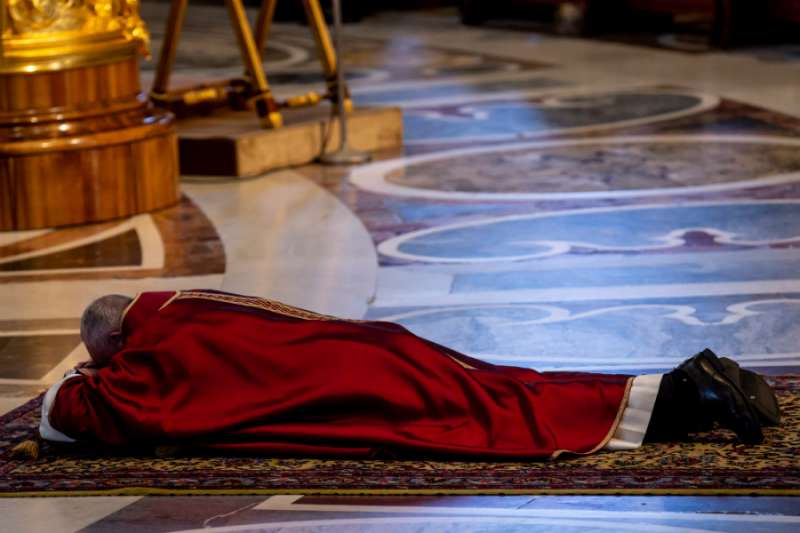At the Vatican’s Good Friday service, the papal preacher connected Christ’s Passion with all in history who have suffered the degradation of their human dignity, highlighting in particular the experience of African-American slaves.
“The final word is not and never will be injustice and oppression. Jesus not only restored dignity to the disinherited of the world, he also gave them hope,” papal preacher Father Raniero Cantalamessa said in his homily in St. Peter’s Basilica April 19.
“We can say to the poor, the outcasts, those who are trapped in different forms of slavery still occurring in our society: Easter is your feast,” he said.
Reflecting on the rejection and hatred experienced by the “suffering servant” described by the Jewish prophet Isaiah, Cantalamessa said “the Crucified One” is a “prototype and representative of all the rejected, the disinherited, and the ‘discarded’ of the earth.”
“The African-American writer and theologian Howard Thurman—the man Martin Luther King considered his teacher and his inspiration for the non-violent struggle for human rights—wrote a book called ‘Jesus and the Disinherited.’ In it he shows what the figure of Jesus represented for the slaves in the south,” Cantalamessa said.
“When the slaves were deprived of every right and completely abject, the words of the Gospel that the minister would repeat in their segregated worship — the only meeting they were allowed to have— would give the slaves back a sense of their dignity as children of God,” he continued.
Howard Thurman, 1899-1981, was a Protestant minister and civil rights leader, who helped to found the Church for the Fellowship of All Peoples, one of the first interracial and interdenominational churches in the United States in 1944.
The papal preacher continued, “The majority of Negro Spirituals that still move the world today arose in this context. At the time of public auction, slaves experienced the anguish of seeing wives separated from their husbands and children from their parents, being sold at times to different masters. It is easy to imagine the spirit with which they sang out in the sun or inside their huts, ‘Nobody knows the trouble I have seen. Nobody knows, but Jesus.’”
Fr. Cantalamessa, a Capuchin friar, has been the official papal preacher since he was appointed to the role by Pope St. John Paul II in 1980. He offers meditations to the pope and members of the Curia on Fridays during Advent and Lent, and he preaches the homily for the Good Friday veneration liturgy.
Pope Francis presided over the liturgy of the Lord’s Passion and prostrated himself before the altar in St. Peter’s Basilica at the beginning of the Good Friday service.
After St. John’s Gospel was chanted in Latin, Fr. Cantelamessa said in his homily, “the Church has received the mandate from its founder to stand with the poor and the weak, to be voice for those who have no voice.”
He continued, “the second historical task that religions need to take on together today, besides promoting peace, is not to remain silent in the face of the situation that is there for everyone to see. A few privileged people possess more goods than they could ever consume, while for entire centuries countless masses of poor people have lived without having a piece of bread or a sip of water to give their children.”
“No religion can remain indifferent to this because the God of all the religions is not indifferent to all of this,” Cantalamessa said.
The papal preacher said that Jesus on the cross “becomes a symbol” for the “part of humanity that is humiliated and insulted.”
He noted that “the most profound meaning” of the passion and death of Christ “is not social but spiritual and mystical.”
“‘Ecce homo!' 'Here is the man!’ exclaims Pilate … These are words which, after Christ, can be said of the endless host of men and women who are vilified, reduced to being objects, deprived of all human dignity,” Cantalamessa explained.
“One would want to exclaim, ‘You who are rejected, spurned, pariahs of the whole earth: the greatest man in history was one of you! Whatever nation, race, or religion you belong to, you have the right to claim him as yours,’” he said.

